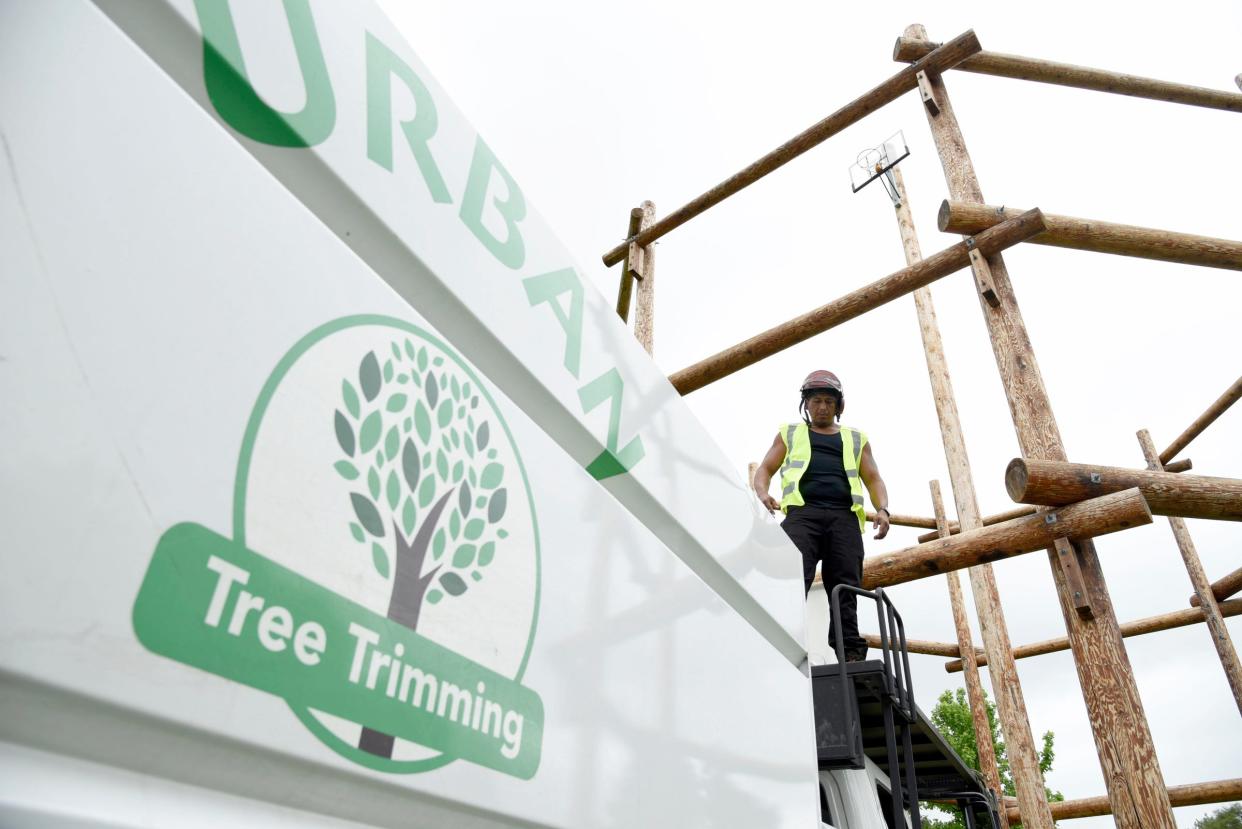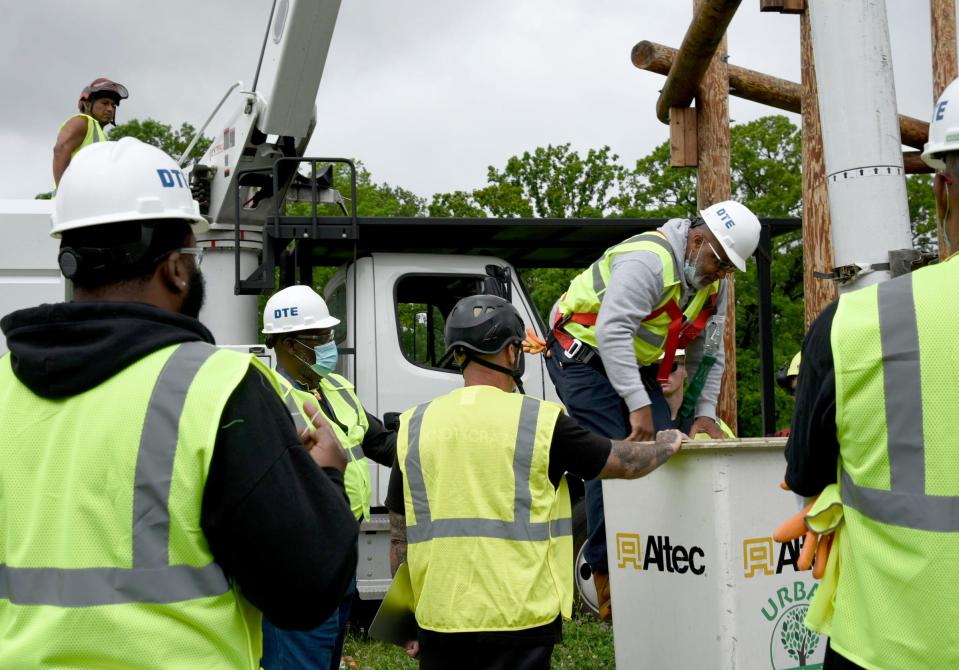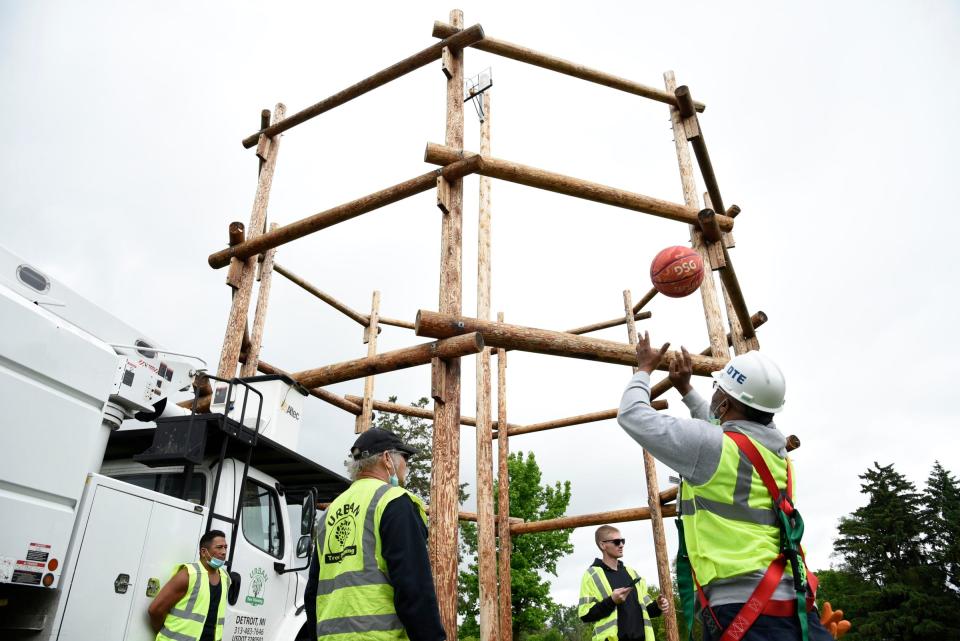DTE is desperate for tree trimmers — and ready to pay top dollar

It had rained that morning and the night before, so it wasn't safe to climb the towering set of telephone-pole Tinkertoys on the edge of Rouge Park.
Instead, the second-day recruits at DTE's Tree Trim Academy shot baskets last week, 80 feet above the ground.
"I was cool," said Gerald Nelson, 58, the first to take a herky-jerky ride in a lift bucket and lob basketballs toward the hoop at the top of an eight-story pole. He wasn't overly successful, which didn't mesh well with his competitive nature, but scoring wasn't really the object.
Short term, the idea behind the exercise was to introduce students to using their hands while standing upright much farther in the air than most sensible people ever go.
Long term, the goals are loftier.

One class at a time, DTE hopes to chip away at a local shortage of line clearance tree trimmers and a national crunch in the skilled trades. It wants to increase the number of women and minorities in a staggeringly one-dimensional field that has been as male and white as the trees are green.
And, of course, it wants to keep the electrons flowing.
"It's a win-win-win," said Terrell Lockhart, of Southfield, DTE's manager of local resource development, with maybe another win or two thrown in. The International Brotherhood of Electrical Workers needs members, the wires need protection from falling limbs, the customers need power, the city needs jobs, the contractors who ultimately assign the trimmers need a stable workforce.
Dangerous — and lucrative
The academy program is patterned loosely on one that sprouted in the Michigan penal system. Its instructors include a woman in a pink hard hat and a man who gashed his forearm with a chainsaw and wound up in prison.
Those who thrive through seven weeks of knot-tying, climbing, classwork, safety training and more safety training qualify for entry-level status, a nine-day boot camp and then up to two and a half years of apprenticeship.
More: At innovation fair, young inventors take on problems that confound grown-ups
More: In death, science fiction maven Alan Clive takes trip of a lifetime
They're paid at every level, including $100 per day at the training academy and $18-plus per hour as apprentices. By the numbers, half of the 59 academy graduates from the pilot class last year were Detroiters, 47 were persons of color, six were women, and all departed with job offers.
Tree trimming and electrical line jobs rank high on lists of most dangerous occupations, and line clearance combines both of them. It's challenging enough that apprentices work for a year before anyone hands them a chainsaw.

But a basketball? That's harmless, even if it hits the turf with the thud of a falling pumpkin and bounds 25 feet in the air.
Nelson, the oldest member of a class of seven, looked confident even if he only nailed one of five shots. A few minutes later, a visibly anxious young man clutched the side of the bucket as it rose.
"Watch," Routheaux said from down below. "He's going to get confident. He's going to start smiling."
He didn't, particularly, but everyone on the ground cheered as if he had. Tree trimming, like basketball, is a team sport.
Blazing a trail
Sara Routheaux, of Sterling Heights, said she was the first woman in more than a decade to climb trees and hack branches for IBEW Local 17.
"It was very intimidating," she said. The long road to becoming a journeyman starts with getting a commercial driver's license, or CDL, "and I'd never even driven a stick shift."
Nevertheless, she persisted. On the job since 2016, she has earned the right to be just another cog in the system, but experience has taught her that she isn't. Instead, she's the difference between "Not me" and "Why not me?"
"When I'm out working, I've had women stop and say, 'I could do this,' " Routheaux said. "Or they bring their daughters to the work site."
According to Lockhart, 98% of line clearance trimmers across the country are white, and virtually all of that group is male.
"It's all about nepotism," he said. "Your father or your uncle is already in the local, and he says to go down to the union hall and sign up."
Journeymen can pull in $80,000 per year with standard overtime, or $120,000 with a lot of it. Efren Esquivel, of southwest Detroit, said he works nonstop, with a goal of retiring in a decade at 55.
He had stopped by for an informal chat with the students, their new work boots in a loose semicircle around his comfortably worn pair.
On a blustery day, he was wearing a sleeveless shirt beneath his yellow safety vest, exposing trunk-like arms.
"I go to the gym every morning," he said. "I want to be the best. I want everybody to talk about me."
He had tried college, but left within a year carrying $10,000 in student loan debt. He found his place in the high branches.
"Not many people can go to the top of that tree, stand up, and do what you need to do," he said. "Not many people want to."
A looming shortfall
As baby boomers continue to age out of the skilled trades, the lack of a societal backup plan is becoming more apparent.
Figures from the National Electrical Contractors Association show that 7,000 electricians start at the bottom every year, but 10,000 retire. The Home Builders Institute says the industry will need 740,000 more skilled workers per year through 2024 to keep up with demand.
DTE keeps 1,600 tree trimmers busy each day, Lockhart said, with 600 of them from out of state.
"That's millions of dollars in per diems," he said — and plenty of reasons to bankroll the academy.
Classes meet in the sort of low-slung prefab structure that usually graces a construction site. The large, grassy lot behind it once held an apartment building, then the burned-out shell of the apartment building.
Looming behind the schoolroom is a skeletal wooden octagon with three telephone-pole crosspieces on each side attached to uprights nearly as high as the basketball hoop.
Eventually, the site might also train solar technicians, substation operators and the throngs that will install EV chargers.
For now, DTE and Local 17 will stay busy reminding high school graduates that college — and college loans — aren't the only option.
"Not a lot of them look at skilled trades as a viable future," acknowledged Mike Pittman, of Newport, the local's assistant business manager.
A study released in April by Stanley Black & Decker found that only 16% of 14- to 19-year-olds will give serious thought to skilled trades, possibly because only 42% expect them to pay at least $50,000 annually and nearly 19% estimate the starting rate at less than $20,000.
That's a lot of dubious numbers to overcome. One useful selling point, Pittman said, is the academy, which provides a key answer well ahead of the standard schedule.
"Something we struggled with before this," he said, "was that we'd place apprentices with contractors, they'd work a couple of months, and they'd realize they're terrified of heights."
Occupational hazards
Jeffrey Gunnells, of Clarklake was always comfortable in the sky. That didn't keep him from hurting himself 60 feet up and then nearly destroying himself afterward on the ground.
He's the ex-con who serves as one of the two core instructors. In 2009, he mangled the inside of his tattooed left forearm with a chainsaw, severing tendons. He rushed back to work too quickly after surgery, needed a second operation, grew overly fond of prescription painkillers and became a cautionary tale.
By the time he was convicted of helping plan an armed robbery in 2012, he had bullet holes in his F-250, a hazard of stealing from drug dealers. He served almost eight years and might still be behind bars if a program called Vocational Village hadn't come to the Parnall Correctional Facility in Jackson.
One of the specialties was tree trimming. The program became prime recruiting ground for DTE, with Gunnells a particularly valued catch.
At 52, he's a voice of wisdom. "Electricity will rock you to sleep," he'll warn, "because it's silent."
Or, as basketballs fall, he'll sense something amiss with a student behind him who has taken off his protective helmet to smooth his longish hair: "Matt, put that hat on, buddy."
"I'm invested in this program," he said. He met a lot of the people involved when he was still wearing prison jumpsuits, and now that he has paid his debt to society, he feels like he owes one to them.
The students come via Focus: HOPE, the multifaceted social service agency in Detroit. Cohorts are typically limited to 12 to 15 students — "We have to keep an eye on 'em," Gunnells said — and the current edition was depleted by a few delayed entries.
Applicants are screened by Focus: HOPE, do two weeks of career prep there and earn a certificate in customer service. Next comes a week of study for the CDL, a necessity for pre-boot-camp hires known as woodsmen drivers. Then it's two weeks at the academy and two more weeks working on the CDL, and after that the future beckons.
Nelson is eager to meet it.
He has been a real estate agent. He has owned a group home and a landscaping company. Tree work, he said, "sounded like a challenge, so here I am. It's an opportunity to reinvent myself."
It was lunchtime. He'd had three more trips in the bucket before buckling down for a test on knots and safety.
His last time up, he said, he'd made four baskets in five tries.
He's learning.
Neal Rubin is okay with heights, but less than talented with chainsaws. So he can still be reached at NARubin@freepress.com, or @nealrubin_fp on Twitter.
This article originally appeared on Detroit Free Press: DTE's Tree Trim Academy hiring for dangerous, but high-paying job

